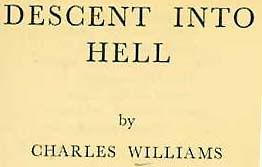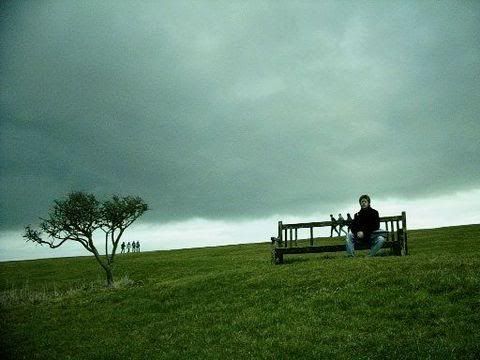C.S. Lewis's Top Ten Most Influential Books: #9
In 1962, The Christian Century magazine asked C.S. Lewis the question, "What books did most to shape your vocational attitude and your philosophy of life?" His answer can be found where I found it, here. This is the first installment of a series on these ten books. It will continue in the order I read them. As you can see, I'm starting with number nine on the list, so there will be no order to my posts.

The most immediate thing about Descent into Hell (1949), besides its arresting title, is its difficulty. Just a glance at the chapter headings shows what I mean: titles like "The Magus Zoroaster," "Via Mortis," or "The Doctrine of Substituted Love." The content of these and the other chapters is as opaque as the titles indicate, but no more - Mr. Williams makes no effort to spell things out for us, as Mr. Lewis usually does, but it is far from postmodern inscrutability. Indeed, because it isn't taken too far, I think this elusive quality is one of the best aspects of the book. I feel I could read Descent into Hell ten times, and each time gain a whole new level of insight into its depths. For, if anything, it is deep.
Like The Last Battle, the entire plot proceeds on a hill -- Battle Hill, a small suburban community of intellectuals and artists. The story centers around the production of a play by the foremost member of this community, the playwright Peter Stanhope. Mr. Stanhope is the Voice of Reason, the wise "Professor Digory" character. Adela Hunt, one of the actresses, shows us what Mr. Williams thought of the typical academic progressive type, through her continual inability to grasp the eternal truths embodied in Mr. Stanhope and his play. Pauline Anstruther is another actress, oppressed by a continual fear of a doppelganger which she encounters sometimes roaming the streets. Lawrence Wentworth is a history scholar who descends into a hell of his own making, a prison of self-absorbed solitude built from the bricks of his obsessively jealous lust for Ms. Hunt. The story focuses on the struggles of Ms. Anstruther and Mr. Wentworth to cope with their demons -- Anstruther's outer, and Wentworth's inner. Another is important figure is the ghost of a man who died on Battle Hill long before Mr. Stanhope and the others took up residence there. Through him we see Mr. Williams' idea of the literal Hell, as opposed to the figurative, self-created hells of characters like Mr. Wentworth.
Charles Williams was a colleague and friend of C.S. Lewis at Oxford, and one of the foremost members of the loose collective known as the Inklings there. It is easy to see some of the ways by which C.S. Lewis was influenced here. Early in the novel there is an interaction between the aging playwright Mr. Stanhope and the young, naive Ms. Fox:
"...Nature's so terribly good. Don't you think so, Mr. Stanhope?"It is easy to see the connection from here to Aslan, the terrifying figure of God who is not at all "a tame lion."
Stanhope ... turned his head and answered, "That Nature is terribly good? Yes, Miss Fox. You do mean 'terribly'?"
"Why, certainly," Miss Fox said. "Terribly -- dreadfully -- very."
"Yes," Stanhope said again. "Very. Only -- you must forgive me; it comes from doing so much writing, but when I say 'terribly' I think I mean 'full of terror'. A dreadful goodness."
"I don't see how goodness can be dreadful," Miss Fox said, with a shade of resentment in her voice. "If things are good they're not terrifying, are they?"
"It was you who said 'terribly'," Stanhope reminded her with a smile, "I only agreed."
"And if things are terrifying," Pauline put in ..., "can they be good?"
He looked down on her. "Yes, surely," he said, with more energy. "Are our tremors to measure the Omnipotence?"
I have to confess, I'm quite sure that most of the valuable insight Mr. Lewis found in this novel went straight over my head. Still though, I'm impressed by the insight I did catch. It comes most often in the dialogues, as above, of various characters with Mr. Stanhope, who is inspiring in his humble Godliness. Here is another priceless exchange:
"You talk as if life were good," she said.In Mr. Lewis's body of work, Descent into Hell is most closely aligned with The Great Divorce. Both are works of the imagination (not of theology -- it is important to remember that neither author claims orthodoxy here) that ask, "What if we could peek behind the curtain of death? What might we see?" The central difference that I see lies in style.
"It's either good or evil," he answered, "and you can't decide that by counting incidents on your fingers. The decision is of another kind..."
Mr. Lewis's work is prosaic and straightforward. I saw Mr. Williams's tombstone, though, and on it, it said quite prominently POET. Descent into Hell is poetic -- in its language as well as its ambiguity. Like the best poems, it requires several readings to really begin to grasp the depth of the truths behind it. I've only read it once though, so that's all I have to say about it.



4 Comments:
This sounds like a great project--largely because it will get you reading Williams and Chesterton, who are great.
Descent into Hell, though, isn't my favorite Williams book--though I thoroughly enjoyed it. I think that titl goes to War in Heaven, followed, maybe, by The Greater Trumps.
You reacted to Williams largely the same way I did when I first read him (All Hallow's Eve)--an appreciation, but not quite a Lewis-like interest. I read a couple more, and took on more of Lewis' feelings on them. I think Williams is the sort you have to read multiple times to get a sense of how he works. If you do, I think you'll find that, in fact, there's even more insight in the story than in the dialogue.
I've heard Williams described as "Stephen King if he had been a protestant theologian." And I have to say, I'm holding out hope that, once the Tolkien and Lewis movies are done, we'll get to see some Williams onscreen.
http://www.catch27.com/join.php?invite=25423
do it. its like friendster and facebook in one.
Just marry CS and come home already. I miss you, mrs. clive staples lewis.
haha. the above is from me. sorry
--Carly
Haha, yes, I guessed it was you Carly. Only you...
Timothy -
Yes, I have no doubt I'll find more insight with multiple readings. And now that I think about it, quite an interesting film could be made from Descent into Hell. Though maybe his other books might be even better suited... ? I'll find out eventually. If only I could read as fast as you... As far as Chesterton goes, I've only read The Man Who Was Thursday. Oh and I saw the play, too.
Also, I forgot to mention, thanks for this post go to the University of Sussex library and the late Rev. Philip Arthur Micklem, from whose library my copy first came.
Post a Comment
<< Home